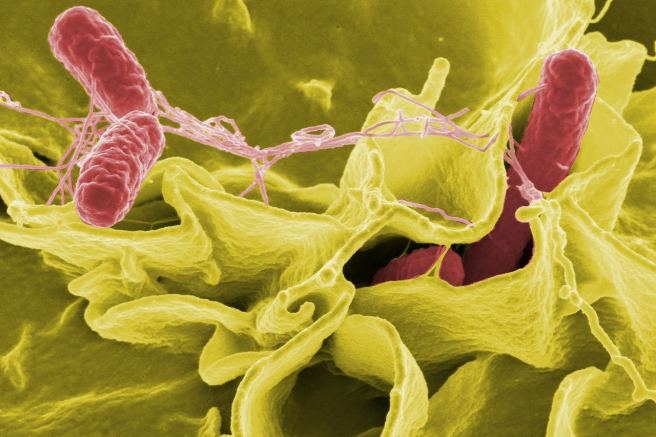Newly discovered mechanism of gene regulation underlies bacterial virulence

A cellular structure called the ribosome makes up the machinery that produces all of the proteins necessary for life. Ribosomal RNAs (rRNAs), which share a similar composition and helical structure to DNA, are a key component of ribosomes. rRNAs themselves are encoded in the genome in the form of multiple rRNA gene copies, and these copies have long been presumed to be highly similar/identical among individuals of a species. At the same time, rRNA copies with a significant number of sequence differences within the same species have been observed in all domains of life; these are called species-specific divergent rRNAs. However, their functional importance has been relatively overlooked until recently.
In a study published in Nature Microbiology, a team of researchers from Chung-Ang University and their collaborators set out to understand the function of these divergent rRNAs. According to one of the corresponding authors of the study, Prof Kangseok Lee of Chung-Ang University, “Emerging evidence has suggested that the ribosome plays an intrinsic regulatory role in mRNA translation into proteins, and we sought to find out to what extent this was mediated by the heterogeneous composition of the ribosome.”
As the model organism for the study, the researchers selected the marine bacterium Vibrio vulnificus, which is closely related to the causative pathogen of cholera. V. vulnificus itself is considered an “opportunistic” pathogen, causing skin and wound infections, sepsis, and the majority of seafood-related deaths in humans. About 10% of the ribosomes in this bacterium, termed I-ribosomes, include a divergent rRNA. Using a variety of molecular and proteomic analyses, the researchers identified genes whose expression is regulated specifically by I-ribosomes. The list of I-ribosome-regulated proteins included those involved in heat shock, stress regulation, and carbon metabolism. According to Prof Lee, “Our results indicated that I-ribosomes preferentially produce proteins important for V. vulnificus to rapidly respond to changes in temperature or nutrient availability in order to survive.”

Based on this finding, the scientists sought to confirm the important role of I-ribosomes in V. vulnificus survival and determine whether I-ribosomes play a role in the bacterium’s virulence. Mice injected with a genetically engineered strain of the bacterium in which the divergent rRNA component of the I-ribosome was deleted showed better survival than mice injected with bacteria containing functional I-ribosomes. This indicated that divergent rRNAs are critical for virulence of the bacterium V. vulnificus. Based on their role in virulence, I-ribosomes could represent a potential target for the future development of novel therapies for infections caused by bacteria of the Vibrio genus.
Overall, the study revealed that genome-encoded divergent rRNAs are regulators of gene expression at the ribosome level, highlighting a previously underappreciated role of rRNA sequence variation in regulating gene expression. In V. vulnificus, this regulation appears to specifically act in response to environmental changes, contributing to bacterial survival and virulence. Concluding the study, Prof Lee states, “Notably, divergent rRNAs have been observed in several other species, and future studies are still needed to determine to what extent the patterns revealed in V. vulnificus translate to more distantly related organisms.”
Reference
Title of original paper: | Divergent rRNAs as regulators of gene expression at the ribosome level |
DOI: Name of the author (from Chung-Ang University): Affiliation: | https://doi.org/10.1038/s41564-018-0341-1
Kangseok Lee Department of Life Science, Chung-Ang University |
About Chung-Ang University
Chung-Ang University is a private comprehensive research university located in Seoul, South Korea. It was started as a kindergarten in 1918 and attained university status in 1953. It is fully accredited by the Ministry of Education of Korea. Chung-Ang University conducts research activities under the slogan of “Justice and Truth.” Its new vision for completing 100 years is “The Global Creative Leader.” Chung-Ang University offers undergraduate, postgraduate, and doctoral programs, which encompass a law school, management program, and medical school; it has 16 undergraduate and graduate schools each. Chung-Ang University’s culture and arts programs are considered the best in Korea.
About Professor Kangseok Lee from Chung-Ang University
Dr Kangseok Lee is a Professor of Life Sciences at Chung-Ang University and has co-authored over 120 publications. He is one the corresponding authors of this study. Prior affiliations of Prof Lee’s include the Wayne State University Department of Biological Sciences and the Stanford University Department of Genetics.
Media contact: kangseok@cau.ac.kr
Comments
You're looking to give wings to your academic career and publication journey. We like that!
Why don't we give you complete access! Create a free account and get unlimited access to all resources & a vibrant researcher community.














